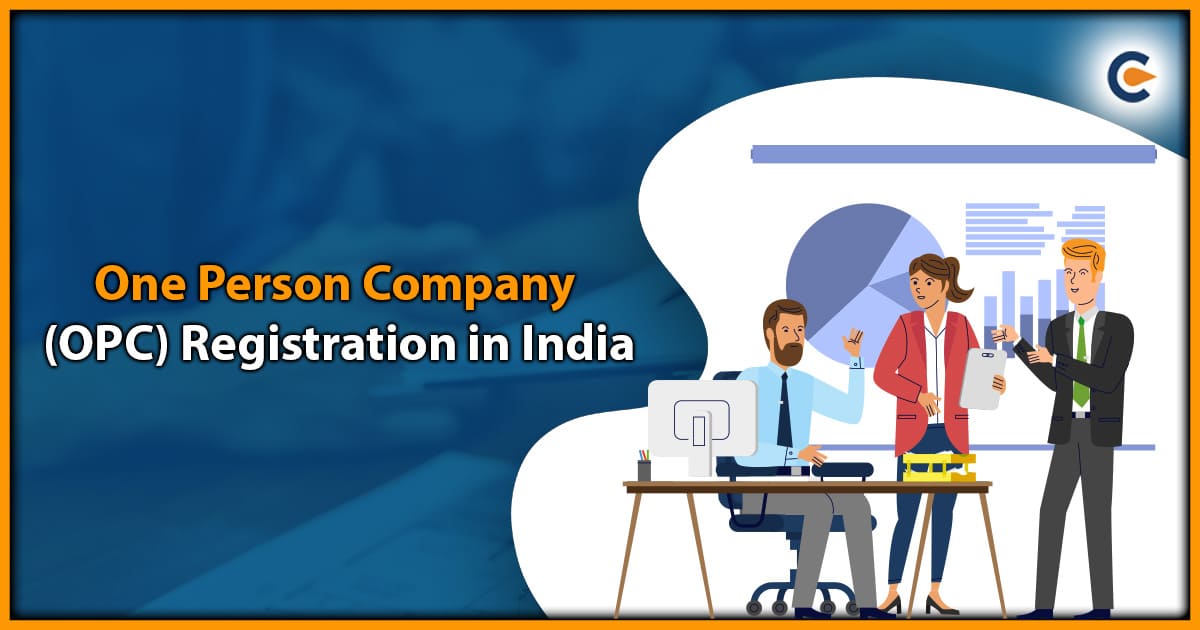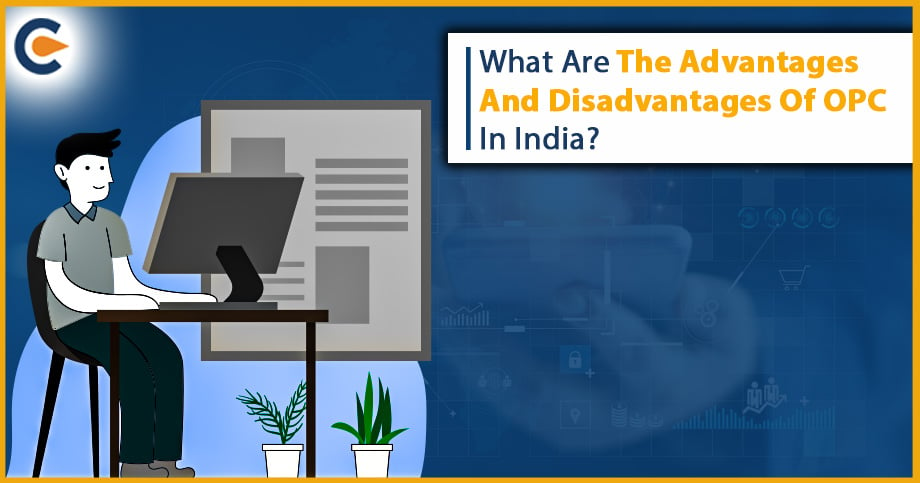A one person company in India gives you independence from third parties and flexible work hours regardless of where you are. To lawfully conduct business as a one person corporation in India, you must abide by several laws and regulations. If you own a one person company or are looking to start one, this post is helpful.
Shedding Light on One Person Company
Understanding One Person Company is essential before you begin any process. The Companies Act 2013 introduced various new concepts not present in the previous version of the law, revolutionizing corporate rules in India.
The introduction of the One Person Company concept was one such game-changer. It led to the discovery of an entirely new method for forming businesses that offered the limited liability protection that sole proprietorships and partnerships lacked, along with the flexibility that a company form of entity may provide.
Before the new Companies Act was enacted in 2013, several other nations had already acknowledged that an individual could start a company. China, Singapore, the United Kingdom, Australia, and the United States were among them.
Experience the innovation of One Person Company Registration in India to secure your business with limited liability and global recognitions.
What might Encourage the Creation of an OPC?
It has been more than seven years since the concept of OPC gained the expected traction. OPC will be promoted when a private firm, limited liability partnership, or public company can join as a single member. Locating the shareholders is going to be easy.
In corporations, bare share ownership will be necessary. Following Section 89 of the Companies Act regarding registered and beneficial owners would not be essential. Each of these new companies will operate as a wholly-owned subsidiary. Regardless, the OPC is allowed to have more than one director.
The government may alter the relevant laws to allow OPC to invest in the securities of any corporate entity. A tax-efficient structure would further stimulate OPC’s development or conversion. In this manner, OPC would receive genuine encouragement, improving the ease of conducting business.
The One Person Company (OPC), established under the Companies Act of 2013, was a godsend for business owners who wished to set up their companies as private limited companies without adding any further members. As its name suggests, an OPC is unique among corporate structures in that it centres attention on the company’s single member or shareholder.
According to experts, an organization of individuals shouldn’t be forced to implement a novel notion by a person who wishes to do so through a business regime. Even though they are the only members in this situation, they still require a platform to operate effectively. For this reason alone, the Act gave rise to the innovative concept of the one person company. The Act also approved a few compliances required to incorporate an OPC.
Tax Implications of OPC
The tax ramifications of a One Person Company (OPC) add to its allure as a commercial organization. Comparing this structure which has a single member to other business models, such as sole proprietorships, reveals multiple advantages, demonstrating the true motivation of a one person company. The tax-related advantages of an OPC are:
· Limited Liability Protection
Liability protection is an OPC’s main tax-related benefit. The arrangement prevents the member’s private assets from being utilized to pay off business obligations or court judgements. As a result, personal liability is limited to the funds contributed to the business.
· Credibility Enhancement
An OPC can increase the company’s legitimacy. Being the only company owner may indicate to prospective partners and clients that you are unreliable financially, but having an OPC shows stability and dedication. Consequently, this can make partnerships and commercial transactions easier.
· Tax Flexibility and Planning
OPCs offer tax flexibility, enabling owners to use tax planning techniques to minimize their tax obligations. By keeping personal and company assets separate, OPC owners can frequently have more control over their tax responsibilities.
· Advantageous Tax Rates
OPCs can benefit from beneficial business entity-specific tax rates, sometimes less than individual tax rates. As a result, the owner may save taxes.
· Income Tax Slabs and Deductions
OPCs can take advantage of business entity-friendly income tax slabs and deductions, which may lessen the business owner’s overall tax burden.
Optimize your tax benefits with tax filing and registrations to ensure your OPC enjoys favourable tax rates and fill compliance effortlessly.
Procedures for Insolvency & Liquidation for a Single-Person Company
Any director or shareholder of a one person business may apply to start insolvency proceedings against the industry when it becomes insolvent. The court will choose a liquidator to oversee the company’s assets and allocate them to the creditors. If you think about going through with a liquidation, you should get expert assistance because the procedure can be drawn out and complicated.
How to Establish an OPC?
An individual can establish an OPC by signing the memorandum of association and meeting other conditions outlined in the Companies Act of 2013. Such a memorandum must include information on a nominee who will take over as the only member of the company if the original member passes away or cannot engage in contractual obligations.
With the registration application, this memorandum and the nominee’s approval to be nominated should be sent to the Registrar of Companies. Such a candidate may remove his name by submitting the necessary paperwork to the Registrar. The member may later withdraw his nomination.
Regulatory Compliance Needs for One Person Company
A corporation with just one member is known as a one person business (OPC). With the introduction of the Companies Act of 2013, this kind of corporation is comparatively new in India. OPCs are well-liked because they provide many advantages of traditional businesses but have less complicated rules and compliance needs.
An OPC can use a private company as the sole form of incorporation. This implies that it will have fewer shareholders, and the company is not eligible for listing on a stock exchange. An OPC may have no more than fifty shareholders, not including directors or workers.
The requirement that an OPC have a minimum paid-up capital of ₹ 1 lakh is the most crucial thing to remember. This is less than the other companies’ current minimum paid-up capital requirement of ₹ 5 lakhs.
Creating an OPC: A Brief Walkthrough
OPC in India is very straightforward, given that the business owner possesses all the necessary papers. First, the company owner needs to get a Digital Signature Certificate (DSC) and a Director Identification Number (DIN). After obtaining these, the business proprietor can apply for incorporation by submitting the necessary paperwork to the Registrar of Companies (ROC).
Business owners should speak with an experienced attorney or accountant to ensure they meet all requirements.
The rules for establishing an OPC differ from those for establishing a standard company. The business owner must get a Certificate of Commencement of Business (CCB) from the ROC upon the incorporation of the OPC. This document demonstrates that the business has been duly registered and is authorized to conduct business in India.
After obtaining the CCB, the OPC must submit yearly reports to the ROC. The filing deadline for these returns is 60 days after the fiscal year ends.
What are the Attributes of an One-person Company Venture?
The following are typical characteristics of a one person business:
· Private Enterprise
According to the Companies Act’s Section 3(1)(c), one individual may establish a company for any permissible purpose. It goes on to say that OPCs are private businesses.
· Single-member
Unlike private corporations, OPCs are limited to having a single member or shareholder.
· Nominee
One distinctive characteristic of OPCs that sets them apart from other business forms is the requirement that the lone company member list a nominee at the time of company registration.
· No Eternal Succession
An OPC has only one member; therefore, upon his passing, the nominee can accept or decline to become the group’s lone member. Other businesses don’t experience this because they operate under the theory of eternal succession.
· Minimum One Director
OPCs require a minimum of one member (the director), and 15 directors are allowed. No minimum paid-up share capital is required for OPCs; the Companies Act of 2013 does not specify a minimum paid-up capital level.
· Unique Benefits
Under the Companies Act, OPCs are granted several advantages and exemptions that are not available to other types of companies.
Procedures for Opening a Bank Account for a One Person Business
You must create a bank account for your business to launch a one person operation in India. Opening a business bank account can be simpler than this, but we’re here to help walk you through the steps. Selecting a bank will need to be your initial task. Banks with experience working with small businesses can provide you with better services and support, so you should give them some thought. After deciding on a bank, you must go to a branch and inform them that you are launching a one person business.
They might ask you to complete specific papers and need some paperwork from your business, like your Memorandum or Articles of Association. The next step is to open a bank account for your business. Opening a personal bank account will be comparable to this process, although there can be further criteria proving that your company is registered online. You can begin banking for your one person business when your account is opened.
Membership in One Person Companies
In India, a one person corporation can only be formed by natural persons who are citizens or residents of India. The OPC nominees are subject to the exact requirements. Furthermore, at no time may such a natural person hold memberships in or nominations to more than one OPC.
It is crucial to remember that OPC membership is limited to natural individuals. This does not occur in the case of firms, wherein companies may own shares and be members. In addition, children are not allowed to nominate or become members of OPCs under the statute.
Conversion of OPC into Other Companies
The rules governing creating a one person company explicitly prohibit transforming OPCs into Section 8 companies for charitable purposes. Additionally, until two years have passed since their incorporation date, OPCs are not permitted to voluntarily change into other types of businesses.
Privileges of OPCs
According to the Companies Act, OPC is granted the following benefits and exemptions:
- They are not required to convene yearly general meetings.
- Cash flow statements are not a requirement for their financial statements.
- Directors may sign annual returns instead of just the company secretary.
- They are exempt from the provisions about independent directors.
- Their articles may include more justifications for a director’s office to be placed on vacation.
- They are exempt from several meeting and quorum-related regulations.
- Compared to other companies, they can give directors a higher salary.
How is OPC Incentivized?
The Indian government has implemented policies that incentivize the formation of one person corporations (OPCs) to encourage entrepreneurship and facilitate business transactions. Under the Companies Act of 2013, an OPC may be incorporated with as little as ₹ 1 lakh in minimum paid-up capital. OPCs also benefit from other advantages, including lowered income tax obligations and laxer compliance standards.
The government’s promotion of OPCs aims to inspire more individuals to choose entrepreneurship as a career path. If it becomes simpler to establish and manage a business, more people will be inspired to launch their enterprises. This will stimulate the economy and produce new jobs. Compared to other organizations, one person businesses have less stringent compliance obligations. Compared to different kinds of companies, this makes operating an OPC considerably simpler for an individual.
Understand India’s Employment Laws in OPC
Understanding India’s employment rules is crucial to running a one-person business there. These rules control all aspects of employment, including selecting and managing staff, determining pay, and guaranteeing adherence to safety and health standards. If you intend to expand your one person business into India, you need to be aware of the employment regulations in that nation. These laws control everything from hiring and firing staff to establishing pay and guaranteeing that health and safety rules are followed.
Before recruiting employees, you should become familiar with the pertinent laws, as ignorance of the law is not an acceptable excuse. But it can be challenging to navigate India’s complicated employment rules, mainly if you are not headquartered there. Thankfully, several tools are available to ensure you abide by the law. A summary of the primary employment regulations in India can be found on the government website, which is an excellent place to start.
To Wrap Up
For Indian entrepreneurs, the One Person Company model has changed the game by offering a flexible and streamlined corporate structure. The government’s incentives, which include complete ownership control, tax benefits, more straightforward compliance, and restricted liability, have made OPCs a desirable choice for anyone wishing to formalize their business endeavours.
Forming an OPC can help you grow your business, safeguard your assets, and take advantage of the many financial and legal benefits offered by the Indian government, regardless of whether you are a consultant, small business owner, or freelancer. India promotes a culture of creativity and entrepreneurship by providing supportive conditions for small business owners, contributing to the nation’s economic progress. Empower your entrepreneurial journey with a One Person Company! Visit our website Corpbiz to get through a seamless OPC Registration and start reaping the rewards of full control and simplified compliance.
Frequently Asked Question
What is an OPC?
A one person company (OPC) is a private limited company that permits one person to establish and manage a firm while maintaining complete ownership and control. It offers the benefits of limited liability and corporate status.
How does the limited liability feature of OPC benefit the owner?
The owner’s liability in an OPC is capped at what they have invested in the company. Financial protection is ensured if the firm accrues debts or legal liabilities because personal assets are not in danger.
Can OPCs convert into other forms of companies?
Yes, an OPC must become a private limited company if its paid-up capital exceeds ₹50 lakh or its yearly turnover exceeds ₹2 crore. This promotes expansion while granting the company structural flexibility.
Who is eligible to form an OPC in India?
To form an OPC, a person must be an Indian citizen or resident who has resided in India for at least 182 days during the previous fiscal year. In addition to being the only owner, the individual must choose a successor in the event of their demise or incapacitation.
What is the process for incorporating an OPC?
To incorporate an OPC, the owner must designate a nominee, complete the necessary paperwork, and register the business online through the Ministry of Corporate Affairs (MCA) portal. Thanks to the streamlined process, small business owners will find it easier to launch their ventures.
What are the prospects for OPCs in India?
Because of their business benefits, flexibility, and limited liability protection, OPCs are growing in popularity. As long as the country maintains its startup-friendly environment and offers incentives to small enterprises, OPCs are anticipated to contribute significantly to entrepreneurship and economic growth in India.
When does an OPC need to be converted to a private limited company?
If an OPC’s paid-up share capital surpasses INR 50 lakh or its average annual turnover for the three years prior exceeds INR 2 crore, the OPC must be transformed into a private limited company.
Are there any specific industry-based incentives for OPCs?
OPCs can indirectly benefit from government programs and regulations that boost particular industries, even though there are no industry-specific incentives specifically for them.
Read Our Article: Low Investment Business Ideas for Kanpur











